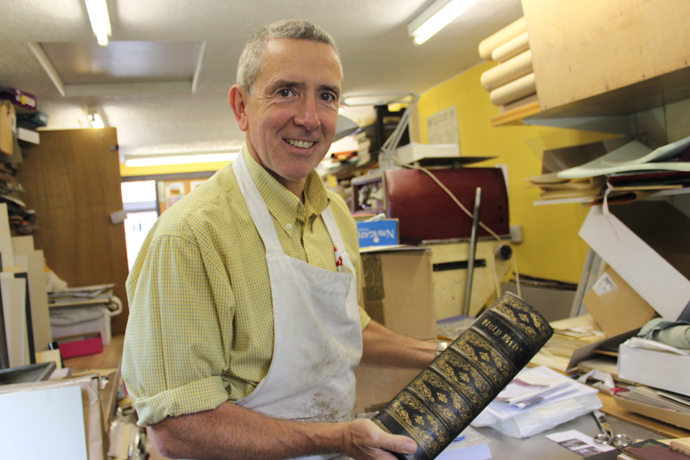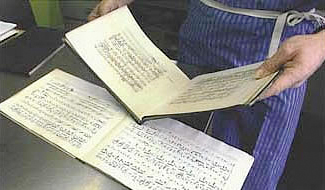Works such a bind for bookman Phil
 What do you do if, after 25 years in secure, paid employment, you suddenly find yourself on the redundancy scrapheap? Put the skills you’ve acquired to work on your own behalf, of course – by setting up in business for yourself. That’s what Phil Winskill did 14 months ago when he was made redundant from his job as a bookbinder at York University.
What do you do if, after 25 years in secure, paid employment, you suddenly find yourself on the redundancy scrapheap? Put the skills you’ve acquired to work on your own behalf, of course – by setting up in business for yourself. That’s what Phil Winskill did 14 months ago when he was made redundant from his job as a bookbinder at York University.
For a quarter of a century, including a four-year apprenticeship, Phil had worked quietly in the university bindery, one of a small team of craftsman who bound students’ theses, and repaired or restored books from the university library. Then, in March 2000, all that changed. The university brought in external auditors who said it was no longer economically viable for it to have its own in-house bindery. Ten months later, on January 31, 2001, Phil found himself without a job. It was a devastating blow – and time for some serious thinking about his future. The 42-year old soon realised he did not want to waste the skills he’d developed over the years. “So I picked myself up,” he says. “I realised I didn’t want to do anything else, and I thought that if I could make a go of it, I could carry on sustaining my life doing the job I know best.”
 When setting up in business on your own, of course, it helps if the skills you have acquired are ready marketable, or if there is an obvious demand for the work you’re trained to do. In Phil’s case, with the university bindery closed, there were plenty of students who needed these binding to tide him over as he set up on his own. Nevertheless, it was a daunting prospect. He took out a loan and, after getting the necessary permission, ploughed that and some of his redundancy money into building a bindery in place of the wooden garage at his York home. He bought a new guillotine for trimming pages, and picked up the rest of the equipment he needed.
When setting up in business on your own, of course, it helps if the skills you have acquired are ready marketable, or if there is an obvious demand for the work you’re trained to do. In Phil’s case, with the university bindery closed, there were plenty of students who needed these binding to tide him over as he set up on his own. Nevertheless, it was a daunting prospect. He took out a loan and, after getting the necessary permission, ploughed that and some of his redundancy money into building a bindery in place of the wooden garage at his York home. He bought a new guillotine for trimming pages, and picked up the rest of the equipment he needed.
It was a strain at first, but since the university no longer had its own bindery, the university library soon began to supply him with work restoring and repairing books. Then other commissions began to come in – restoring handwritten musical scores for the Castle Howard library, repairing old Bibles and other antiquarian books, even cloth-binding two copies of the memoirs of Hovingham Hall’s retired butler for Sir Marcus Worsley.
A year later, he admits everything may have actually worked out for the best. “It was quite a gamble in a way” he admits. “But it is nice to have a challenge. And if I could turn the clock back, I would still be glad that things have ended like this. “Running my own business has changed my life. I have developed so much. It can be tiring, especially when people phone me up at all hours. As a business, you cannot really say no, at least until you know how the business stands. “but I feel I am doing well. The business is successful and doing very well and I love the responsibility of it.
For further information visit www.yorkbookbinding.co.uk













